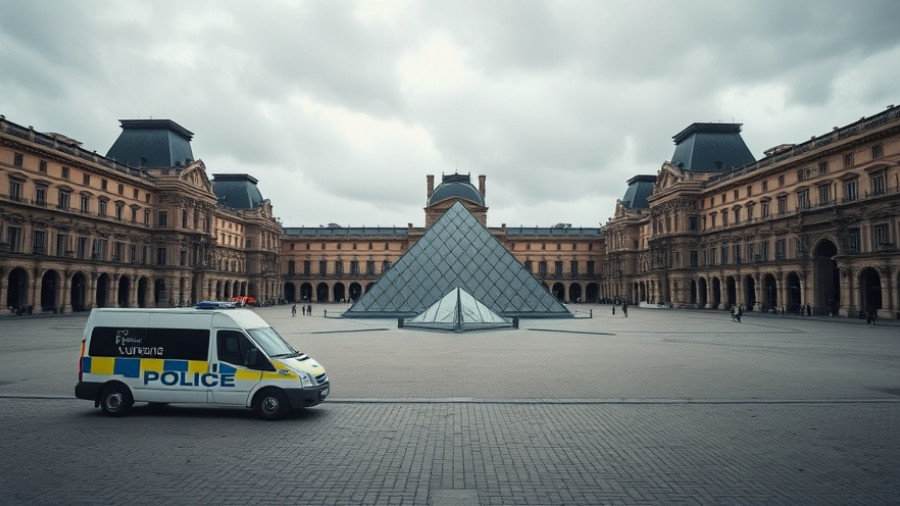
The Shocking Heist: What Happened at the Louvre?
In a brazen daylight robbery that lasted mere minutes, a gang of thieves targeted the Louvre Museum in Paris, stealing invaluable crown jewels that have significant historical ties to France. The heist, which unfolded on a Sunday at approximately 9:30 AM, involved a meticulously planned operation where the thieves used a lorry and a ladder to access the prestigious Apollo Gallery. This enormous breach of security at one of the world’s most famous museums has left many in disbelief.
In 'France reels after Louvre jewellery heist | BBC News', the coverage of the theft sheds light on significant issues around museum security and cultural loss, prompting us to explore these implications further.
Why This Heist Matters Beyond the Price Tag
While eight items of jewelry were snatched, including pieces emblematic of France's storied history, the aftermath is even more significant. Jewelry expert Alexander Leger poignantly stated, "This is France itself that has been stolen from us." Such high-profile theft magnifies cultural losses that transcend money. Each jewel carries a narrative connected to French royalty and tumultuous historical events, presenting an irreplaceable loss for the country and its cultural tapestry.
Implications for Security in Iconic Institutions
The heist has reignited a ferocious debate about the adequacy of security measures in French museums. Just last month, the Natural History Museum in Paris experienced a similar breach where items worth over half a million pounds were taken. Many have questioned how such security lapses could occur in a facility that continuously draws millions of visitors. Currently, expert discussions are evolving, centering on the potential need for increased surveillance systems and security protocols in these historic landmarks.
The Emotional Toll on France and Its Citizens
The outrage among French citizens is palpable. Many feel saddened and angry that such a spectacle could unfold in their beloved city. The Louvre, a symbol of national pride and cultural heritage, now bears the scars of this crime. Reflecting on local sentiments, Andrew Harding, reporting from Paris, noted the frustration of the French public as they consider what this heist means for their identity and image on the global stage.
Future Predictions: Will the Jewels Ever Be Recovered?
Experts doubt the recovery of these stolen treasures. As Leger pointed out, precious stones do not trigger alarms at security checkpoints, making them easy to transport. The likelihood is high that these jewels will be dismantled and sold on the black market, forever lost to the public eye. For families and individuals in the UK, this situation serves as a cautionary tale about the fragility of cultural assets and the importance of supporting museums and global heritage preservation.
Linking International Events to Personal Choices: Why It Matters to Your Wallet
While watching international news can feel distant, incidents like the Louvre heist resonate with British audiences, particularly those who are sensitive to the socio-economic implications of crime and security. As families grapple with rising living costs, understanding the international landscape helps in making informed financial decisions at home. The loss of such heritage can lead to diminished tourism, which impacts local economies globally, including the UK.
Turning Awareness into Action: Support Cultural Preservation
In light of these events, there’s a compelling call-to-action for individuals and families to advocate for and invest in arts and culture. Consider supporting local museums and heritage sites—whether by visiting exhibitions or donating to preservation efforts. Such contributions can maintain the cultural fabric that binds societies and can ultimately lead to a resurgence of trust in security measures that protect these treasures.
The recent heist at the Louvre has brought to the forefront the vulnerability of our shared cultural assets, leading to pressing discussions about security, community identity, and the need for preservation. It’s a reminder that each jewel we lose is a piece of history, making it vital for us to act and ensure that these treasures are not taken from future generations.
 Add Row
Add Row  Add
Add 




Write A Comment